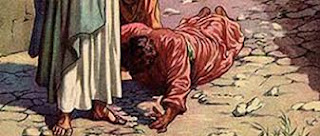The majority of Christendom think that since Jesus was worshipped, this means he is God. They will also often refer to the passage where Jesus says,
“You shall worship the Lord your God, and serve Him only” (Matt. 4: 10).
Note that Jesus did not say, “I am the LORD your God, worship me only.”
In the Hebrew culture worship is not reserved exclusively for God. Worship was offered to God and other people. For example:
- Lot “worshipped” the two strangers as they entered Sodom (Gen. 19: 1).
- Abraham “worshipped” the Gentile leaders of the land where he lived (Gen. 23: 7).
- Jacob “worshipped” his older brother Esau (Gen. 33: 3).
- Joseph’s brothers “worshipped” him (Gen. 43: 26).
- Ruth “worshipped” Boaz (Ruth 2: 10).
- David “worshipped” Jonathan (1 Sam. 20: 41).
- David “worshipped” King Saul (1 Sam. 24: 8).
- Mephibosheth fell on his face and “worshipped” David (2 Sam. 9: 6).
- Abigail “worshipped” David the outlaw (1 Sam. 25: 23, 41). The whole congregation “worshipped” the king (1 Chron. 9: 20).
In Rev. 3:9, the saints will be worshipped,
Behold, I give of the synagogue of Satan, of them that say they are Jews, and they are not, but do lie; behold, I will make them to come and worship before thy feet, and to know that I have loved thee.”
People who were worshipped were God’s representatives. This is called “Jewish Agency.” When a superior commissions an agent to act on his behalf, the agent is regarded at the person himself. We can take a few examples from scripture. For instance:
Jacob wrestled with “a man” all night until dawn and said he had “seen God face to face” (Gen. 32:24-30). When we read the book of Hosea 12:3-4 it states, “As a man he [Jacob] struggled with God; he struggled with the angel and overcame him.”
When Israel started their journey through the wilderness we read in Exodus 13:21,
The LORD went ahead of them in a pillar of cloud to lead them on their way during the day and in a pillar of fire to give them light at night, so that they could travel day or night.”
Then in Exodus 14:19 we read,
“And the angel of God who had been going before the camp of Israel, moved and went behind them; and the pillar of cloud moved from before them and stood behind them.”
Here we have the LORD Himself who went ahead of them in a pillar of cloud and there other passage says it was the angel of God. The angel of God is the angelic representative of Yahweh as if the angel is Yahweh Himself. Now it might be said that this speaks of Jesus the Messiah, but if they want to call and say Jesus is an “angel,” they will run into many problems trying to read that into the text.
Notice when Moses gathers the people together to tell them of the great signs and wonders the LORD did for them, he says,
You have seen all that the LORD did before your eyes in the land of Egypt to Pharaoh and all his servants and all his land; the great trials which your eyes have seen, those great signs and wonders (Deut. 29: 2-3).
Now in verse 6 he says,
You have not eaten bread, nor have you drunk wine or strong drink, in order that you might know that I am the LORD your God.
No one would have mistaken that Moses was claiming to be the LORD their God. Moses, as God’s agent, speaks as though he is the LORD himself.
Concerning the concept or “law” of Jewish agency, The Encyclopedia of the Jewish Religion states:
Agent (Heb. Shaliah): The main point of the Jewish law of agency is expressed in the dictum, “a person’s agent is regarded as the person himself” (Ned. 72B; Kidd, 41b). Therefore any act committed by a duly appointed agent is regarded as having been committed by the principal, who therefore bears full responsibility for it with consequent complete absence of liability on the part of the agent. (R.J.Z. Werblowsky, G. Wigoder, New York: Adama Books, 1986, p. 15.)
We can compare this concept when a person is given “Power of Attorney” for someone. They have full rights to speak on behalf of that person and take care of all his affairs in all matters as if he were the person himself.
In the New Testament Jesus is the ultimate agent of God, "power of attorney" so to speak. He is the messiah sent from God (“sent,” not meaning Jesus literally came down from heaven as though he preexisted his birth) as all other agents, whether men or angels, were sent.
So when it comes to worshipping Jesus, the Jewish people did not recognize him to be God himself, but as the prophet of God, sent from God. When Jesus did mighty works, they glorified God through him (Matt. 9: 8; 11: 27; 28: 18; Luke 7: 16; 9: 11; 10: 22.).
Summary
The Hebrew and Greek word for "worship" apply to God and also apply to superior human agents of the only true God. Worshipping a superior human agent did not make them the only true God. Jesus is the ultimate spokesman for God and said to be the “image of the invisible God” (Col. 1:15), “and the express image of his person” (Heb. 1:3), which means he perfectly reflected God's mind and character while he walked on this earth, but this does not make him the only true God. Both are worthy of worship, that is, Jesus as the lord Messiah, and the ULTIMATE praise and worship to the ONLY TRUE GOD AND FATHER of our lord Jesus Christ. (John 17:3; Eph. 1:3; 1 Peter 1:3; 2 Cor. 1:3)

No comments:
Post a Comment